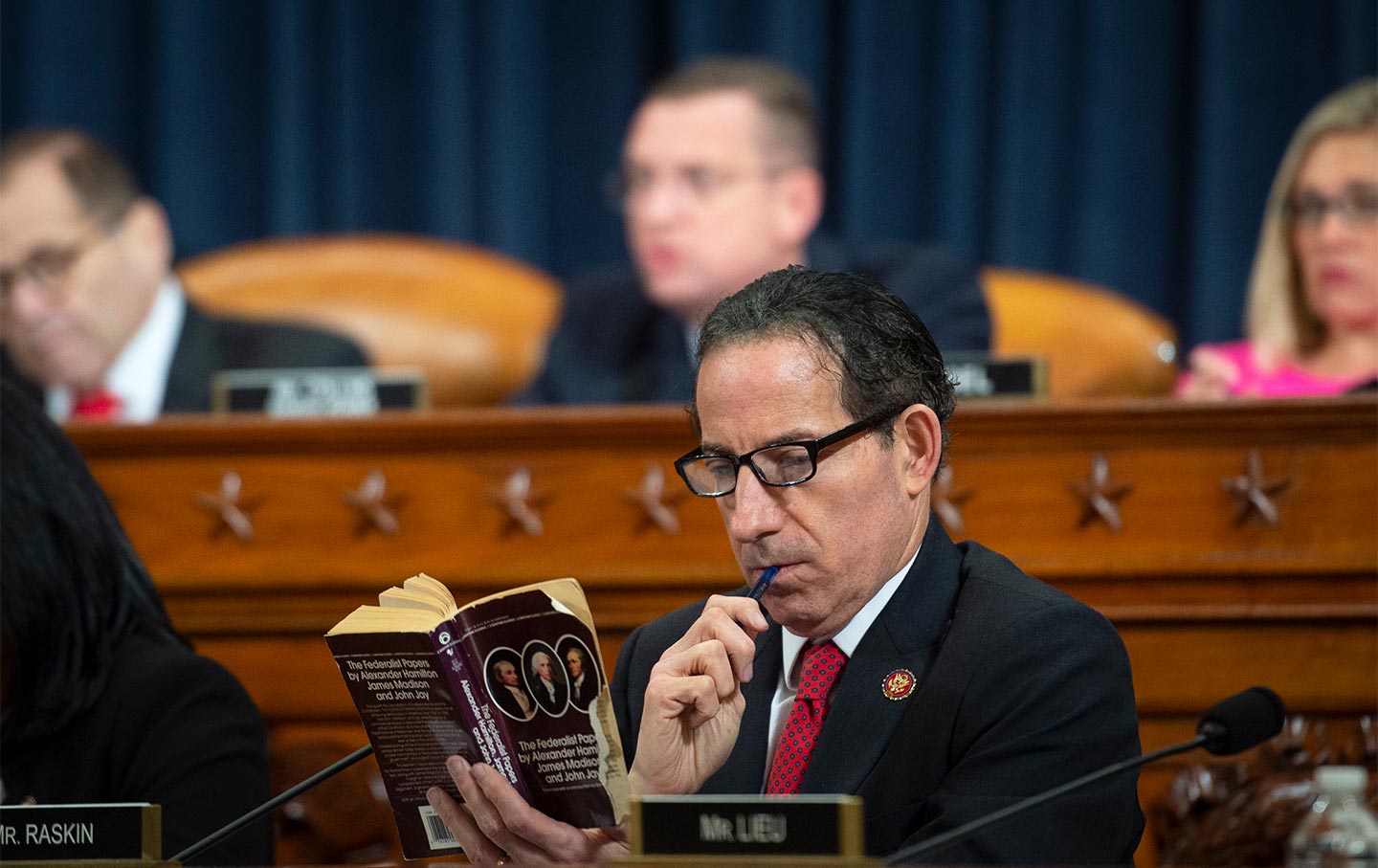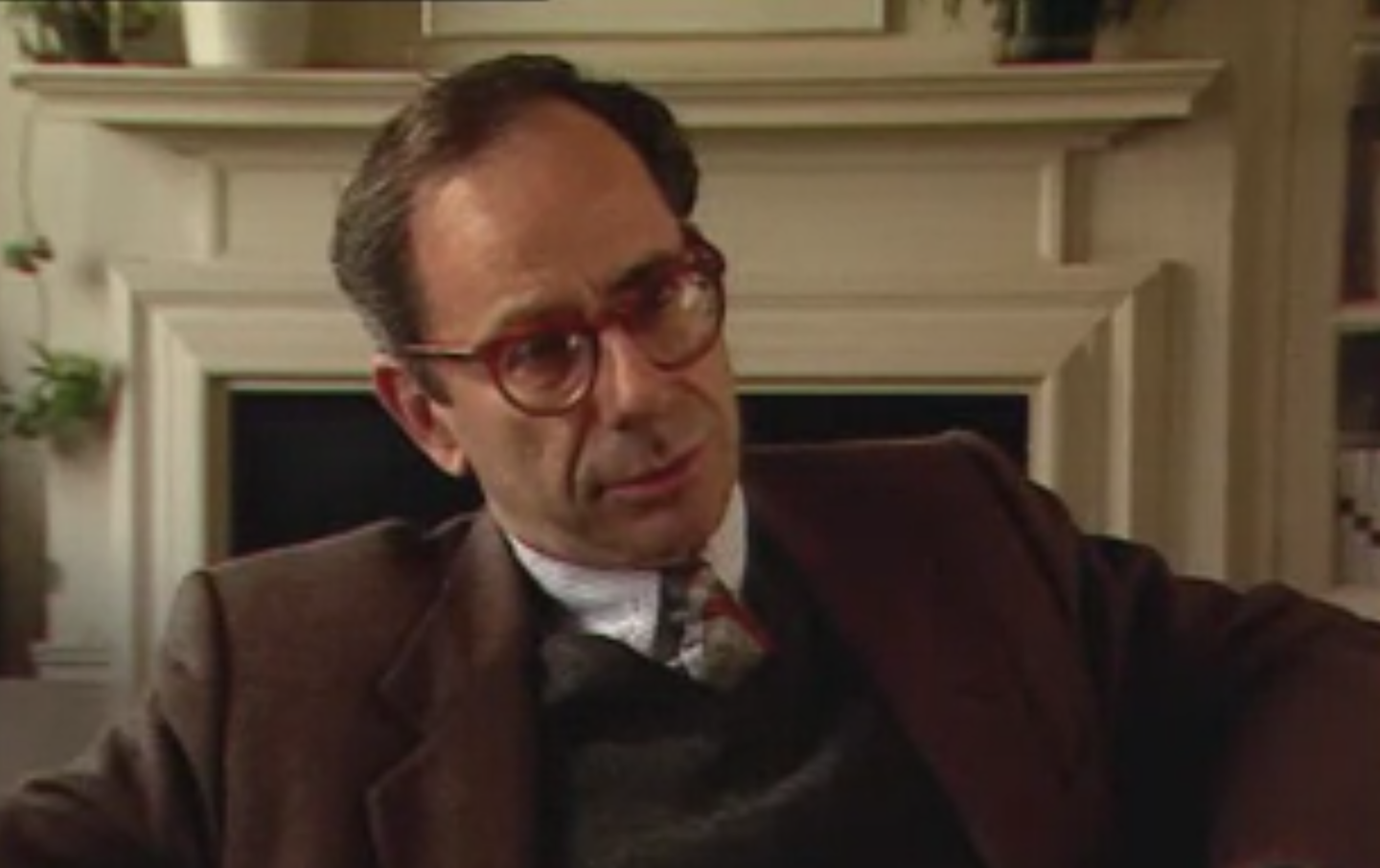“When students of the American story ask 100 years from now how the United States began to find its way back from the mob violence, destruction, and death that Donald Trump unleashed on this country, they will recall the prose and poetry with which Representative Jamie Raskin damned the former president who incited insurrection against democracy.” So wrote Nation national affairs correspondent John Nichols just hours after Raskin displayed his remarkable power as the leader of the House’s team of impeachment managers for Trump’s second impeachment trial.
Raskin, a law professor who was elected to the House after a long career in Maryland’s Senate, in academia, and in activism, opened the trial with an intellectually dazzling argument for why the trial was constitutionally legitimate and morally necessary.
We consider Jamie, a deeply valued contributor on legal and justice issues for over 40 years, a member of The Nation family. In our pages, and at Nation events, he has been reasoned, passionate, compelling, and eloquent. And his grace has always moved us, never more so than when he suffered an unimaginable personal tragedy—on the last day of 2020 when Jamie lost his 25-year-old son, Tommy, to depression and suicide.
Jamie has long taught about the fragility of democracy, the spine of the Constitution, the treachery of a demagogue, and the necessity of justice. In doing so, he and his colleagues left an indelible stain on Trump, and exposed, sadly, the utter cravenness of Republican senators. He asked them to stand for the Republic, for the Constitution that they take an oath to defend, for their own families, for their own sense of honor. They declined, no doubt able to deceive themselves as they looked in the mirror. But, thanks to Jamie and his team, the citizenry know now the threat posed by Trump’s sedition and by the senators’ cowardice. The House impeachment managers performed a priceless service to the country.
Jamie also dazzled with searing constitutional analysis laced with quotes from Tom Paine, Lincoln, Voltaire, and many other great minds, including this one from his beloved father, Marc Raskin: “Democracy needs a ground to stand on and that ground is the truth.” He, like his father, is a great teacher.
It was Marc Raskin who introduced his son Jamie to The Nation.
For more than 60 years, the elder Raskin, a philosopher, teacher, author, activist, and citizen, provided piercing, informed, and independent insight into the state of our republic. In a city filled with strivers eager to trumpet conventional wisdom, Raskin saw through the trappings of power and the lies and myths that buttress it and called on us to change our course and rebuild our democracy.
Marc was a prodigy in both piano and in public policy.
Still in his 20s, he joined President John F. Kennedy’s national security staff under McGeorge Bundy. From the beginning, Marc questioned the entrenched assumptions of the Cold War foreign-policy consensus.
He was most appalled by the madness of the nuclear arms race. He watched as the Kennedy administration launched a massive buildup on the basis of a fabricated “missile gap.” He was an early and profound critic of the crackpot logic of mutually assured destruction. He saw how mandarins and generals, backed by an immense military-industrial complex, promoted the conventional wisdom of an imperial America that could police the world.
With courage and imagination, Raskin chose not merely to critique but also to act. In 1963, he joined with Richard Barnet, a brilliant analyst from the State Department, to found the Institute for Policy Studies (IPS), with what he called the “extraordinary conceit” of speaking truth to power.
IPS was the first truly independent “think tank.” It took no government money. Its fellows—drawn largely from what Raskin called the “civilizing” movements of the times—were encouraged to think beyond the bounds of conventional wisdom, even while staying engaged with progressives in Congress and the administration.
Marc was a disruptive genius. He warned about the development of the national security state—the complex of war institutions shrouded in secrecy and grounded in claims of executive prerogative—that was and is profoundly at odds with our Constitution and our republic. He criticized the suffocating consensus—anchored by “Cold War and big business assumptions”—that fostered ever-greater inequality at home while committing the United States to endless wars and repeated imperial follies abroad. Raskin embraced the movements—civil rights, anti-war, women’s, environmental, consumer—that made America better, suggesting that the insurgents were creating a new public philosophy grounded in an “existential pragmatism rooted in experience and experiment.”
He sought constantly to build a progressive political force—a movement, a party, a progressive congressional caucus—that would champion an agenda for economic justice and for peace.
He was not simply a theoretician; he was an organizer as well. He believed deeply in what he called “passionate scholarship,” in breaking the barriers between thinkers and doers. “Taking personal risk is the way of maintaining relevance to one’s intellectual work,” he wrote. An early critic of the Vietnam War, Raskin joined with Fall to produce The Viet-Nam Reader,which became the basic text for the teach-in movement. As the war continued to escalate, he co-authored “A Call to Resist Illegitimate Authority,” calling for resistance to the draft. For that, he was indicted as part of the Boston Five, tried, and acquitted.
Marc’s articles as a longtime editorial board member of The Nation—on subjects ranging from the nuclear arms race to the neoconservative assault on free speech to Jean-Paul Sartre and John Rawls—suggested the breadth of his interests and the scope of his intellect.

Representative Jamie Raskin reads a copy of The Federalist Papers during the House Judiciary Committee hearing on the impeachment inquiry of President Trump on Monday, Dec. 9, 2019. (Getty Images / Caroline Brehman, CQ-Roll Call)
Washington is a city that suffocates independent thought, less by repression than by seduction.
That is what made Jamie’s father, Marcus Raskin, so rare and so invaluable. At a very young age, he rejected the trappings of high office to create a space that might speak truth to that power. His influence on ideas and on the legions of young people he mentored was profound.
One young person Marc mentored was his grandson, Tommy. Marc imbued in Tommy intellectual curiosity, an eagerness to hear new ideas, and a rare level of empathy and compassion. Tommy’s intellectual rigor was unwavering. As IPS Director John Cavanagh remembers, Tommy who interned at IPS at 15, would not accept conventional ideas—even progressive ideas—without interrogation. At an IPS roundtable, Tommy argued with foreign policy thinker Phyllis Bennis over the war in Afghanistan with the same eloquence and confidence as his grandfather and his father.
Tommy took nothing for granted—except for the understanding that he needed to learn all he could.
In their time of heartache and grief, Jamie and Sarah Bloom Raskin released a statement “on the remarkable life of Tommy Raskin.” They described “a strikingly beautiful curly-haired madcap boy beaming with laughter and charm, making mischief, kicking the soccer ball in the goal, acting out scenes from To Kill a Mockingbird with his little sister in his father’s constitutional law class, teaching other children the names of all the Justices on the Supreme Court, teaching our dogs foreign languages, playing jazz piano like a blues great from Bourbon Street, and at 12 writing a detailed brief to his mother explaining why he should not have to do a Bar Mitzvah and citing Due Process liberty interests (appeal rejected).” Tommy, his parents added, grew into “an antiwar activist, a badass autodidact moral philosopher and progressive humanist libertarian.”
In 2015, The Nation published a special 150th Anniversary issue. We asked several young people in our orbit to look forward to what a radical future looked like to them. Tommy Raskin, then a sophomore at Amherst College, and a StudentNation contributor, wrote about how “decent Americans across the political spectrum have long agreed that a meaningful ‘moral order’ requires accountability for bullies who torture and kill the innocent, [yet] the American government has spent more than a century providing cover to human-rights abusers all over the world.” Tommy continued, “In the radical future, we must use the political mechanisms available to us to stop state-sponsored torture and murder and to hold power brokers accountable for their complicity in gratuitous violence.”
Marc, Jamie, Tommy are forever part of The Nation family. May their spirit, compassion, and commitment to our beloved Republic, the true power and beauty of America, animate us in the vertiginous yet hopeful days ahead. As Bill McKibben wrote in a lyrical tribute to Jamie, and a new generation of Raskins:
Raskin’s case was made for history—a case against Trump, and the next Trump, and the Trump after that, if we’re lucky enough to endure as a country to see those challenges. And, if we are that lucky, it will be because new generations of Raskins will keep standing up to power, very much in the progressive tradition that goes back to our founding. American history is full of ugliness, but there is beauty at its core, as well, and that was what illuminated this week’s proceedings.
N


